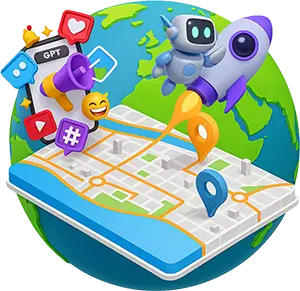AI Automation for Small Business Growth: Unlocking Your Full Potential
Introduction
In today’s fast-evolving digital landscape, AI automation for small business growth is no longer a distant dream—it’s a game-changer that’s transforming how entrepreneurs and marketers operate. From automating repetitive tasks to driving efficiency, AI solutions offer immense potential to scale businesses without taxing their resources. As generative AI continues to enhance productivity, understanding its benefits, practical applications, and strategic integration becomes vital for staying competitive in the modern market.
Why AI Automation is Crucial for Small Businesses
Small businesses often face the unique challenge of doing more with less. Unlike large corporations with abundant budgets, smaller enterprises must find creative ways to maximize their efficiency and output. This is where AI automation steps in as a catalyst for growth.
By enabling businesses to automate routine back-office processes, customer communications, and even complex decision-making workflows, AI transforms time-consuming tasks into seamless operations. For example, tools like AI-driven chatbots can manage 24/7 customer inquiries, while predictive algorithms help streamline inventory management based on real-time data.
Moreover, AI automation for small business growth empowers even the leanest teams to compete with industry giants. A small e-commerce shop, for instance, can use AI-powered marketing tools to create hyper-personalized advertisements, rivaling brands with massive in-house departments. With automation seamlessly integrated, small businesses can finally punch above their weight and focus on innovation rather than administration.
Practical Applications of AI Automation for Entrepreneurs
1. Enhancing Productivity Through Process Automation
Imagine freeing up hours of your day by delegating repetitive tasks to AI. Applications like automated scheduling tools, expense trackers, and even AI-based email sorting systems save valuable time for entrepreneurs.
For example, consider a small accounting firm. Historically, the team might spend endless hours on generating invoices or balancing books. However, with AI tools like QuickBooks or Xero, businesses can not only automate these roles but also improve accuracy—and as we know, fewer errors mean happier clients and increased trust.
Similarly, AI tools such as Zapier can connect multiple software platforms, triggering automated workflows across various applications. This eliminates manual task management and ensures seamless processes, from lead tracking to project completion.
2. Boosting Customer Experience and Personalization
One of the most significant advantages of AI automation lies in its ability to enhance customer experience through data-driven insights. Personalized communication is no longer a luxury—it’s an expectation.
For instance, chatbots, enabled by natural language understanding (NLU), engage with customers in real-time, answering questions with human-like warmth and precision. Shopify store owners who integrate AI chat systems, like ChatGPT, report faster customer service response times and higher client satisfaction rates.
Additionally, recommendation systems—similar to those used by Netflix or Amazon—can be adopted for small retail or service businesses. AI can analyze purchasing patterns to suggest products customers are likely to love, driving both engagement and revenue.
3. Simplifying Data-Driven Marketing Efforts
Marketing has always been an area where small businesses struggle to keep pace. Yet thanks to machine learning, business owners now have access to advanced analytics and marketing automation on a budget.
Take email marketing as an example. Tools like Mailchimp leverage AI to recommend the best sending times, craft subject lines for higher open rates, and even segment audiences based on predictive behavior. As a result, small businesses no longer need specialized marketing teams or expensive ad campaigns to build lasting customer loyalty.
Another game-changer is AI-driven advertising. Platforms like Facebook Ads Manager now feature machine learning optimizations, ensuring your ads target the right audience while minimizing your costs. Therefore, AI automation doesn’t just enhance efficiency—it also makes marketing accessible and impactful.
AI Automation for Small Business Growth: Real-Life Examples
- AI-Powered HR Processes
Hiring managers in small firms often wear multiple hats, making recruitment and onboarding time-intensive challenges. AI-driven platforms like HireVue simplify this by screening resumes, analyzing video interviews for candidate suitability, and even crafting offer letters—all with minimal manual intervention. - Streamlining E-commerce Operations
For small online retailers, time management is essential. AI inventory systems predict product demand while preventing overstocking, saving both space and money. Additionally, logistics apps integrate with delivery systems to track orders, update customers in real-time, and manage returns smoothly. - Smart Financial Management
Even basic financial tasks are benefitting from automation. Small cafes and freelancers, for example, are turning to platforms like Wave to monitor cash flow, track expenses, and generate accurate tax reports without requiring advanced accounting knowledge.
Each of these examples demonstrates how small-scale operations can tap into AI-driven opportunities to simplify complexity, scale efficiently, and drive long-term growth.
GPT Tips for Supercharging AI Automation
AI platforms like ChatGPT bring flexibility and creativity to automation workflows. Try these powerful prompts and hacks to supercharge your small business:
- Automate Customer Support Responses
Prompt: “Write a polite response to customers asking for a refund outside the return-window policy. Include an alternative offer to retain them.” - Generate Personalized Marketing Copy
Prompt: “Create an email marketing campaign targeting repeat customers of a small bakery. Include discounts for their next visit and a thank-you message.” - Streamline Workflow Documentation
Prompt: “Turn these bullet points into a formal, easy-to-understand SOP for onboarding new employees in 3 steps.” - Create Social Media Content Plans
Prompt: “Draft a 7-day Instagram content schedule for a handmade jewelry brand, focusing on engagement and product education.” - Analyze Business Decisions Quickly
Prompt: “Based on this profit/loss statement, which areas should I prioritize to save costs while retaining quality in services?”
These commands allow small business owners to blend creativity with productivity, reducing their workload while maximizing returns.
Conclusion
As technology advances, leveraging AI automation for small business growth is no longer optional—it’s a strategic must. By automating tedious processes, refining customer interactions, and unlocking actionable insights, small businesses can focus on what they do best: adding value to the market.
Incorporating AI tools into your operations not only boosts efficiency but also helps you compete with larger enterprises. Whether you’re streamlining marketing campaigns or simplifying inventory controls, AI is your partner in overcoming the challenges of entrepreneurship.
The future of small business relies on those who embrace transformation today. Harness the power of AI automation to scale smarter, deliver faster, and grow stronger—because in this fast-paced world, success favors the prepared.










0 Comments